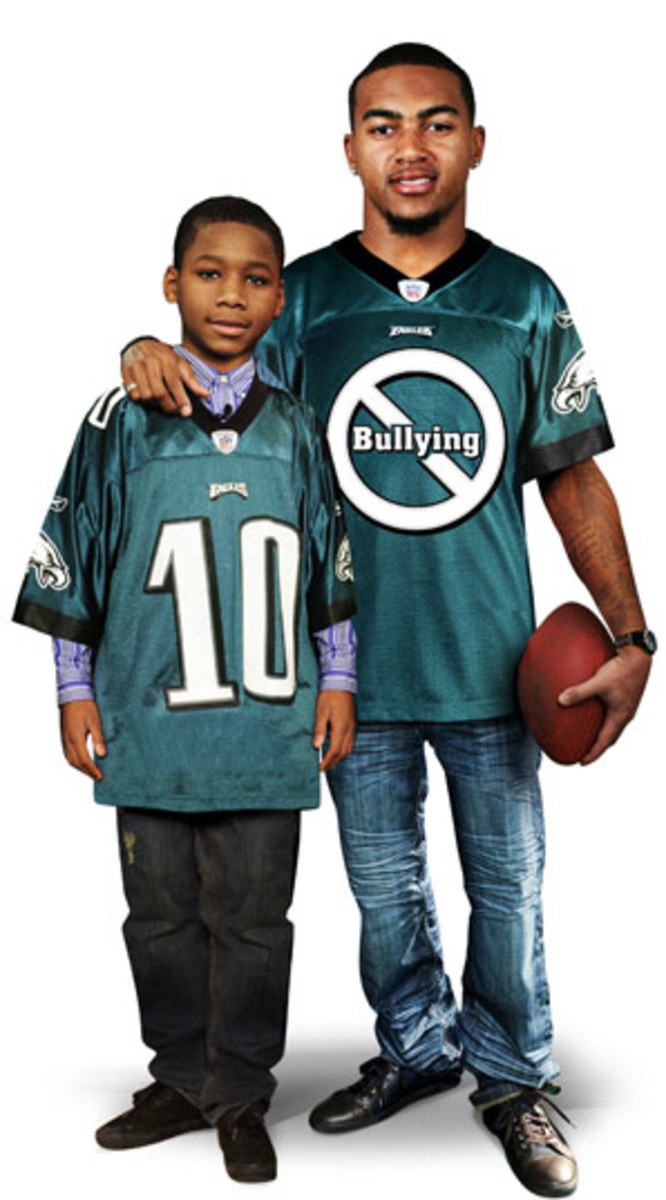Sports can play a pivotal role in helping combat bullying
In this week's SI, I wrote an essay about DeSean Jackson of the Eagles. In it, I neglected to mention the enormous human tragedy of the Eagles losing three football games and instead focused on something else: Jackson's crusade against bullying.
Inspired by a Pennsylvania kid named Nadin Khoury, who stood up against bullies, Jackson spent the offseason on his anti-bullying campaign. Jackson believes athletes can make a huge difference when it comes to stopping bullying.
In many ways, it is the ideal cause for a pro athlete -- exactly the right way to use our country's sports-idol worship for the greater good. There are a million great causes, of course. Anybody who raises money to fight a disease or help underprivileged kids is doing a wonderful thing. But athletes are uniquely suited to fight bullying. From elementary school to pick-up games at the Y, they command respect from their peers. They epitomize cool. And if they say bullying is not cool, that resonates.
But it occurs to me that sports can make a huge impact on stopping bullying in another way, too. We just have to view sports differently.
Playing sports is supposed to build self-esteem, keep us mentally and physically healthy and teach us how to work with others. But Leila Steinberg, who works with Jackson on his anti-bullying campaign, said: "The dynamic of cooperation has to come in addition to competition. We've kind of lost that."
Why?
"The parents half the time are the worst," Steinberg said. "They don't know how to watch their (kids') games. If we're honest, we live through our kids. I started observing all the parents who don't live through their kids in a healthy way. I started seeing this dynamic ... You see these parents fighting in the stands."
Many parents are so worried about teaching their kids how to win that they never teach them how to lose. I'm not just talking about the infamous parents who measure their kids' muscles at birth, have them lifting weights as an infant and don't let them walk near a Dairy Queen, let alone stop in and have a cone. In fact, I explicitly am not talking about those parents. I think it's too easy to point to them and say, "They're the ones with lousy priorities. They don't get it. I do."
I'm talking about the rest of us. We tell eight-year-olds to focus on one sport year-round. It is commonplace for kids switch high schools to get more playing time. Kids learn that winning is the most important thing, even if nobody says it directly.
PEOPLE.COM: MOST INSPIRING ANTI-BULLYING STORIESTIME.COM: SHOULD WE RE-THINK OUR ANTI-BULLYING STRATEGYTIME.COM: SEARCHING FOR MY HIGH SCHOOL BULLY 24 YEARS LATERTIME.COM: WHAT 10 FAMOUS FILMS TEACH US ABOUT BULLYING
And as a result, instead of feeling good about accomplishing whatever they can accomplish, they think sports are just about beating somebody. They don't get the social benefits of playing sports: improved self-esteem and a comfort and understanding of who they are. If more people had that, we would treat people better. We wouldn't bully as much.
What if we told our kids to focus on helping their teammates, not beating their opponents? The on-field objectives would be the same: To excel athletically and try to win. But the reasons for playing would change. Sports would be a much more positive experience.
Steinberg's nonprofit, Alternative Intervention Models, encourages kids through the arts and athletics. Think about how differently we view those endeavors. We don't send kids on traveling art teams. If a 10-year-old draws something surprisingly beautiful, we don't angle to turn him into a millionaire by 25.
We seem to understand that arts are an outlet for creative expression and self-discovery. Sports should be more like that. What if you saw your kid out on the baseball field and viewed him not as a hitter, but as a painter? What if he wasn't trying to be a hero to others, but to himself?
Sports will never be exactly like the arts. Most of our sports are team games, so more people have a vested interest in the result. We can let people down in sports, and we don't cheer at art exhibitions.
"With arts, it is usually self-driven," Steinberg said. "Sports, it's much more acceptable, it's much more social. A lot of times, those that are drawn to the arts for that outlet. It's not done in the community in the same way. The participation is not the same. That's why sports is so much more important in terms of tools you can instill. You have everybody in the family observing."
Still, if sports were more like the arts -- marked more by encouragement than discipline, with a different measurement of success -- we would get so much more out of them. "The potential for reframing how we work with our kids is huge," Steinberg said.
We can start by redefining what it means to win.






